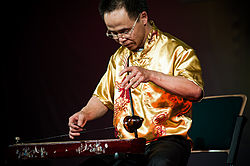Dan bau

Man playing Đàn bầu
|
|
| Other names | monochord, đàn độc huyền, độc huyền cầm |
|---|---|
The đàn bầu (Vietnamese: [ɗâːn ɓə̂w]; "gourd lute"; 彈匏) also đàn độc huyền (or độc huyền cầm ) is a Vietnamese stringed instrument, in the form of a monochord (one-string) zither.
While the earliest written records of the dan bau date its origin to 1770, many scholars estimate its age to be up to one thousand years older than that. A popular legend of its beginning tells of a blind woman playing it in the market to earn a living for her family while her husband was at war. Whether this tale is based in fact or not, it remains true that the dan bau has historically been played by blind musicians. Until recent times, its soft volume limited the musical contexts in which it could be used. The dan bau, played solo, is central to Vietnamese folk music, a genre still popular today in the country. Its other traditional application is as an accompaniment to poetry readings. With the invention of the magnetic pickup, the usage of the dan bau spread to ensembles and also to contemporary Asian pop and rock music. Now, electronics designed for the electric guitar are sometimes employed with the dan bau to further expand its tonal palette.
Originally, the dan bau was made of just four parts: a bamboo tube, a wooden rod, a coconut shell half, and a silk string. The string was strung across the bamboo, tied on one end to the rod, which is perpendicularly attached to the bamboo. The coconut shell was attached to the rod, serving as a resonator. In present days, the bamboo has been replaced by a wooden soundboard, with hardwood as the sides and softwood as the middle. An electric guitar string has replaced the traditional silk string. While the gourd is still present, it is now generally made of wood, acting only as a decorative feature. Also, most dan bau now have modern tuning machines, so the base pitch of the string can be adjusted. Usually the instrument is tuned to one octave below middle C, about 131 Hz, but it can be tuned to other notes to make it easier to play in keys distant from C.
...
Wikipedia
